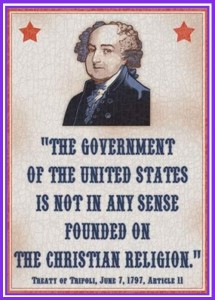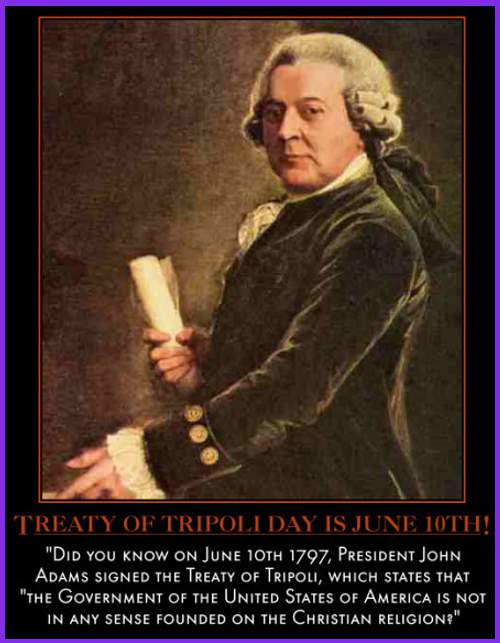the United States of America is not,
in any sense,
founded on
the Christian religion
– Treaty of Tripoli,
Unanimously Rattified by Congress,
7 June 1797
 As regular readers here know, one of my ancestors was John Adams, second president of the United States.
As regular readers here know, one of my ancestors was John Adams, second president of the United States.
Adams signed and congress passed the Treaty of Tripoli in 1797 which in and of itself is of little note as far as historical treaties go, except that this very early treaty in American history has a passage that is particularly relevant to US activity and policy today as the treaty not only specifically states that the US government is not specifically founded as a Christian government but that there should be no inherent tension between the US and Muslim nations.
Here’s the relevant passage:
As the Government of the United States of America is not, in any sense, founded on the Christian religion, — as it has in itself no character of enmity against the laws, religion, or tranquility, of Mussulmen, — and as the said States never entered into any war or act of hostility against any Mahometan nation, it is declared by the parties that no pretext arising from religious opinions shall ever produce an interruption of the harmony existing between the two countries.
The entire text of the treaty was read before congress and was unanimously passed. It seems impossible by today’s political standards and back biting but the very phrase that the United States was not founded on the Christian religion was universally supported and unanimously passed by everyone who vetted this particular official government document. This is not some private diary entry or personal correspondence between one founding father to another, it was an official document reflecting the law and standing and charter of the nation itself.
This passage is also particularly worth noting in that the treaty specifically states that there should be no inherent enmity between the US and Islamic nations or the followers of Islam, something that the anti-mosque rhetoric spewers need to be reminded of.
Now, the key element regarding the notion that the US is NOT officially a Christian nation is one that gets a lot of press on atheist organization webpages and absolutely no play on Christian evangelical political sites.
The US is NOT founded as a Christian nation, although most folks at the time of the founding who identified themselves as religious would have identified themselves as Christian. However, they did not want a theist government, they wanted a government that was practical and effective and did not push one flavor of religion over another or any at all. In fact, most evangelicals who were active at the time of the founding were very much set in the “no official religion” camp as far as the nation’s founding went.
Some of the founding fathers were atheist and others were agnostic while a number were indeed Christian. Today, there are a number of folks who whitewash history and pretend that some of the founding fathers were evangelical Christian who were most definitely nothing of the sort. Folks who paint Thomas Jefferson as some sort of born-again Christian have really done their best to edit reality to the point that they are either peering into a twisted parallel universe for their information of they’re quite delusional. However, while Jefferson may have said quite more than a whole lot that could be construed as anti-religion, the founding of the nation as a state independent of Christianity does NOT inherently mean that the nation is anti-Christian, far from it.
Certainly, many of the founding fathers would have been uncomfortable with a prayer rally conducted by serving members of government . . . but that is likely to have been true not only of the founding fathers who were not religious and those who were most definitely anti-religious but also of those who were deeply religious men of faith themselves. They would not have objected to private prayer or the like, but to public acts of religious faith colored with official office or presentation where the two seem to be confused.
Having said that, it is also clear that when modern atheists look at the anti-Church sentiment of some of the founding fathers they are too quick to ascribe modern viewpoints to these folks. While much of their thinking may have been ahead of their time, their perceptions were most certainly still rooted in the Eighteenth and NOT the Twenty-First Century.
Both sides of the debate today try to twist the view of our founding fathers to conform to their own position . . . while such mind games may be effective to a point, it is not needed and in the end is futile. Our founding fathers could not possibly have envisioned a world like today, the complexity of issues today far outstrip what they could have foreseen. That’s okay. The trick is to take base concepts and build from there and to be willing to adapt to a new world.
In my opinion.
– Brian







